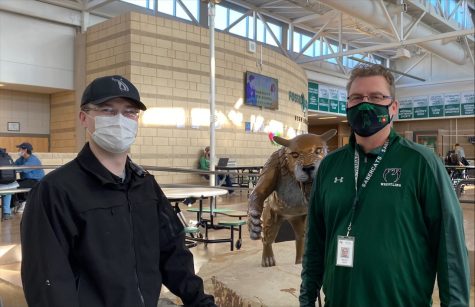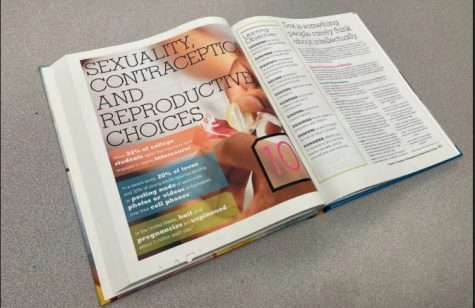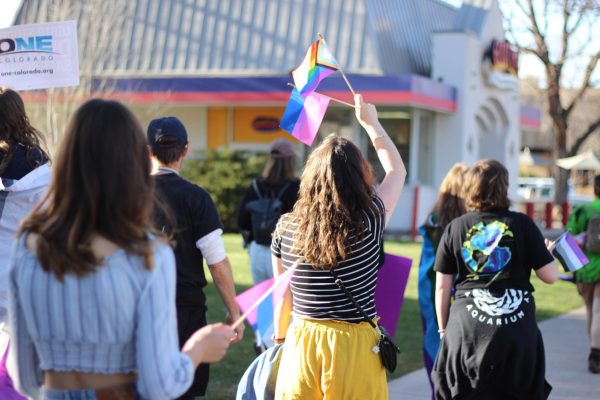Mythbusters chapter two: The limit to student language
Students are met with this frustrating image every time they search something the district deems inappropriate, but is this decision for them to make?
While reading To Kill a Mockingbird for an English class, you may have attempted researching sources to help you understand the text or work through a project about the author. However, you would have been met with a screen that students are all too familiar with, reading “Page Blocked,” causing you to have difficulty finding material to use for your learning. Dependening on what students are searching for, this roadblock can inhibit their capability on possible school projects, but the district does not take this into account when creating the regulations.
The Poudre School District publishes its updated Code of Conduct every fall to establish a standard etiquette for students. One chapter surrounds PSD-issued technology and what students are able to research. The Code of Conduct ensures students they “shall have no expectation of privacy with respect to their use of District information technology and Internet access.”
The document then states the district has the right to “identify information appropriate to their age and developmental levels and to search, evaluate and use information appropriate to their educational goals.” It is possible to appeal to the superintendent but it has not been done before.
Inappropriate usage of district technology can be reported through other peers, teachers, or the data on who searches blocked words from IT. Dean of Students, Deana Kochis, has strong opinions surrounding the blocked words.
As a previous English teacher, she wants all students to maintain their right to free speech. “But it doesn’t mean that it doesn’t come with consequences, right,” said Kochis. “The best way to go around that I would always tell students is I would give them access to like our school databases because then you know, you’re getting like a really good source and nothing from there is necessarily being blocked,” suggested Kochis.
Deans get a list of students and their flagged words, so if you are working on a certain project that may look inappropriate, if you communicate with the dean it will be understood. But ultimately, the deans reserve the right to restrict a specific student’s usage of technology if these inappropriate searches are repeated.
Inappropriate usage of district technology can be reported through other peers, teachers, or the data on who searches blocked words from IT. Understandably, these restrictions cause frustration for all students.
As students grow irritated with the long list of words censored from their educational experience, they also are being reminded to limit certain words and conversations while in classrooms.
Tanya Vattano, a math teacher at Fossil Ridge High school, became frustrated with her students using profanity frequently in her classroom. Vattano sent out an email to her advisory asking them to limit their profanity usage. In the email, she acknowledged that students had not been in classrooms for a long time, and then asked that they remember the expectation of a classroom environment.
When prompted to discuss her thoughts on the use of profanity in schools, Vattano commented, “I think everybody needs to know their setting and their audience and realize that there are different rules for different, you know, settings, different environments.”
While Vattano admitted to using her fair share of profanity while outside of school, she reiterated that there is a different set of rules and restrictions on language while at school. She claims “That’s against the rules…I’m a teacher so I have to uphold the rules.”
These limitations expend administration’s energy in an unnecessary battle and only shows their distrust in the student body as a whole. Although there should be consequences for inappropriate usage of district technology, there are more important battles to be fought when it comes to the issues of our school that affect every student.
With the immense complications surrounding the way school is being run this year, the censoring of student language is an issue that can and should be put on the back burner of the administration’s conscience.
Your donation will support the student journalists of Fossil Ridge High School. Your contribution will allow us to purchase equipment and cover our annual website hosting costs.

Caroline Sears is thrilled to be Editor in Chief along with Melissa May this year. The pair hopes to improve the paper in every way, but they are focusing on ensuring the stories are meaningful and that the paper’s staff is connected.
She is passionate about theatre and her favorite subject is English....

Jordan Brownhill is a senior and the Editor in Chief of Etched in Stone, along with Lizzy Camp. Brownhill has been an integral part of the newsroom since her freshman year. Former Social Chair, she has always excelled at making staff feel comfortable, welcome, and important, while being a strong leader....














Dave C. • Aug 21, 2025 at 7:35 pm
Profanity is for “special occasions” like when you hit your thumb with a hammer. It isn’t cool or hip to use it in everyday conversation, despite what you see in movies and TV (e.g. Bill Maher’s show). If a student uses profanity in a job interview they likely won’t get the job, or get fired if they use such words in business – especially in retail sales. In higher level business affairs you often won’t get contracts if you are profane in conversation – I’ve see that happen. Students need to learn all that. Ms. Vattano is quite correct.